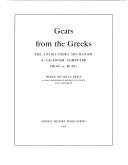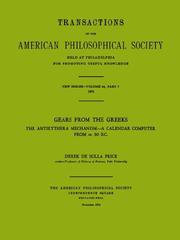| Listing 1 - 6 of 6 |
Sort by
|

ISBN: 0882020196 Year: 1975 Publisher: New York Science history publications
Abstract | Keywords | Export | Availability | Bookmark
 Loading...
Loading...Choose an application
- Reference Manager
- EndNote
- RefWorks (Direct export to RefWorks)
Book
ISBN: 0190618590 0190618582 9780190618582 9780190618599 9780199739349 019973934X Year: 2017 Publisher: New York, NY, United States of America
Abstract | Keywords | Export | Availability | Bookmark
 Loading...
Loading...Choose an application
- Reference Manager
- EndNote
- RefWorks (Direct export to RefWorks)
"The Antikythera Mechanism, now 82 small fragments of corroded bronze, was an ancient Greek machine simulating the cosmos as the Greeks understood it. Reflecting the most recent researches, A Portable Cosmos presents it as a gateway to Greek astronomy and technology and their place in Greco-Roman society and thought"-- "From the Dead Sea Scrolls to the Terracotta Army, ancient artifacts have long fascinated the modern world. However, the importance of some discoveries is not always immediately understood. This was the case in 1901 when sponge divers retrieved a lump of corroded bronze from a shipwreck at the bottom of the Mediterranean Sea near the Greek island of Antikythera. Little did the divers know they had found the oldest known analog computer in the world, an astonishing device that once simulated the motions of the stars and planets as they were understood by ancient Greek astronomers. Its remains now consist of 82 fragments, many of them containing gears and plates engraved with Greek words, that scientists and scholars have pieced back together through painstaking inspection and deduction, aided by radiographic tools and surface imaging. More than a century after its discovery, many of the secrets locked in this mysterious device can now be revealed. In addition to chronicling the unlikely discovery of the Antikythera Mechanism, author Alexander Jones takes readers through a discussion of how the device worked, how and for what purpose it was created, and why it was on a ship that wrecked off the Greek coast around 60 BC. What the Mechanism has uncovered about Greco-Roman astronomy and scientific technology, and their place in Greek society, is truly amazing. The mechanical know-how that it embodied was more advanced than anything the Greeks were previously thought capable of, but the most recent research has revealed that its displays were designed so that an educated layman could understand the behavior of astronomical phenomena, and how intertwined they were with one's natural and social environment. It was at once a masterpiece of machinery as well as one of the first portable teaching devices. Written by a world-renowned expert on the Mechanism, A Portable Cosmos will fascinate all readers interested in ancient history, archaeology, and the history of science"--
Antikythera mechanism (Ancient calculator) --- Astronomy, Ancient --- Calendar, Greek. --- Technology --- Science --- History --- Greece --- Antikythēra Island (Greece) --- Intellectual life --- Antiquities.
Book
ISBN: 9789603860310 960386031X Year: 2012 Publisher: Athens : Kapon Editions,
Abstract | Keywords | Export | Availability | Bookmark
 Loading...
Loading...Choose an application
- Reference Manager
- EndNote
- RefWorks (Direct export to RefWorks)
Underwater archaeology --- Archéologie sous-marine --- Antikythēra Island (Greece) --- Greece --- Anticythère (Grèce) --- Grèce --- Antiquities --- History. --- Antiquités --- Histoire

ISBN: 0871696479 9780871696472 Year: 1974 Volume: 64,7 Publisher: Philadelphia (Pa.): American philosophical society,
Abstract | Keywords | Export | Availability | Bookmark
 Loading...
Loading...Choose an application
- Reference Manager
- EndNote
- RefWorks (Direct export to RefWorks)
Antikythera mechanism (Ancient calculator) --- Calendar, Greek --- Antikythēra Island (Greece) --- Antiquities --- Astronomical clocks --- -Astronomy, Greek --- Greek calendar --- Greek astronomy --- Clocks, Astronomical --- Astronomical instruments --- Clocks and watches --- History --- Cerigotto --- -Antiquities --- Astronomy, Greek --- Mathematical instruments --- Aegilia Island (Greece) --- Andikithira Island (Greece) --- Anticythera Island (Greece) --- Antikithera Island (Greece) --- Antikythira Island (Greece) --- Cerigotto Island (Greece) --- Nēsos Antikythēra (Greece) --- Nisos Andikithira (Greece) --- Nisos Antikythira (Greece) --- Antiquities. --- Antikythēra Island (Greece) - Antiquities
Book
ISBN: 9781107033450 1107033454 9781139519748 1107238234 1107344662 1107349354 1139519743 1107348412 110734591X 1107342163 1107358035 9781107348417 9781107342163 9781107345911 9781107238237 9781107344662 9781107349353 9781107358034 Year: 2013 Publisher: Cambridge: Cambridge university press,
Abstract | Keywords | Export | Availability | Bookmark
 Loading...
Loading...Choose an application
- Reference Manager
- EndNote
- RefWorks (Direct export to RefWorks)
Mediterranean landscape ecology, island cultures and long-term human history have all emerged as major research agendas over the past half-century, engaging large swathes of the social and natural sciences. This book brings these traditions together in considering Antikythera, a tiny island perched on the edge of the Aegean and Ionian seas, over the full course of its human history from the Neolithic through the present day. Small islands are particularly interesting because their human, plant, and animal populations often experience abrupt demographic changes, including periods of near-complete abandonment and recolonization, and Antikythera proves to be one of the best-documented examples of these shifts over time. Small islands also play eccentric but revealing roles in wider social, economic, and political networks, serving as places for refugees, hunters, modern eco-tourists, political exiles, hermits, and pirates. Antikythera is a rare case of an island that has been investigated in its entirety from several systematic fieldwork and disciplinary perspectives, not least of which is an intensive archaeological survey. The authors use the resulting evidence to offer a unique vantage on settlement and land use histories. Considers evidence from Antikythera - the only Mediterranean island to be investigated in its entirety via systematic and intensive archaeological fieldworkEmploys a rare combination of landscape ecology, computational modeling and archaeological survey to offer a unique vantage on settlement and land use histories Analysis is based on unusually detailed, open access digital datasets
Human ecology --- Excavations (Archaeology) --- Ecologie humaine --- Fouilles (Archéologie) --- Islands of the Mediterranean --- Antikythera Island (Greece) --- Méditerranée, Iles de la --- Anticythère (Grèce) --- Antiquities --- Antiquités --- Archaeology --- Antikythēra Island (Greece) --- Fouilles (Archéologie) --- Méditerranée, Iles de la --- Anticythère (Grèce) --- Antiquités --- Environmental conditions. --- Social life and customs. --- Archeology --- Anthropology --- Auxiliary sciences of history --- History --- Ecology --- Environment, Human --- Human beings --- Human environment --- Ecological engineering --- Human geography --- Nature --- Social aspects --- Effect of environment on --- Effect of human beings on --- Aegilia Island (Greece) --- Andikithira Island (Greece) --- Anticythera Island (Greece) --- Antikithera Island (Greece) --- Antikythira Island (Greece) --- Cerigotto Island (Greece) --- Nēsos Antikythēra (Greece) --- Nisos Andikithira (Greece) --- Nisos Antikythira (Greece) --- Mediterranean Islands --- Social Sciences --- Human ecology - Islands of Mediterranean --- Archaeology - Islands of Mediterranean --- Human ecology - Guinea - Antikythēra Island --- Archaeology - Greece - Antikythēra Island --- Islands of the Mediterranean - Environmental conditions --- Antikythēra Island (Greece) - Environmental conditions --- Islands of the Mediterranean - Social life and customs --- Antikythēra Island (Greece) - Social life and customs
Book
ISBN: 9780199739349 019973934X Year: 2017 Publisher: New York, NY, United States of America : Oxford University Press,
Abstract | Keywords | Export | Availability | Bookmark
 Loading...
Loading...Choose an application
- Reference Manager
- EndNote
- RefWorks (Direct export to RefWorks)
"The Antikythera Mechanism, now 82 small fragments of corroded bronze, was an ancient Greek machine simulating the cosmos as the Greeks understood it. Reflecting the most recent researches, A Portable Cosmos presents it as a gateway to Greek astronomy and technology and their place in Greco-Roman society and thought" "From the Dead Sea Scrolls to the Terracotta Army, ancient artifacts have long fascinated the modern world. However, the importance of some discoveries is not always immediately understood. This was the case in 1901 when sponge divers retrieved a lump of corroded bronze from a shipwreck at the bottom of the Mediterranean Sea near the Greek island of Antikythera. Little did the divers know they had found the oldest known analog computer in the world, an astonishing device that once simulated the motions of the stars and planets as they were understood by ancient Greek astronomers. Its remains now consist of 82 fragments, many of them containing gears and plates engraved with Greek words, that scientists and scholars have pieced back together through painstaking inspection and deduction, aided by radiographic tools and surface imaging. More than a century after its discovery, many of the secrets locked in this mysterious device can now be revealed. In addition to chronicling the unlik ely discovery of the Antikythera Mechanism, author Alexander Jones takes readers through a discussion of how the device worked, how and for what purpose it was created, and why it was on a ship that wrecked off the Greek coast around 60 BC. What the Mechanism has uncovered about Greco-Roman astronomy and scientific technology, and their place in Greek society, is truly amazing. The mechanical know-how that it embodied was more advanced than anything the Greeks were previously thought capable of, but the most recent research has revealed that its displays were designed so that an educated layman could understand the behavior of astronomical phenomena, and how intertwined they were with one's natural and social environment. It was at once a masterpiece of machinery as well as one of the first portable teaching devices. Written by a world-renowned expert on the Mechanism, A Portable Cosmos will fascinate all readers interested in ancient history, archaeology, and the history of science^^^
HISTORY / Ancient / Greece. --- Antikythera mechanism (Ancient calculator) --- Astronomy, Ancient --- Calendar, Greek. --- Science --- Technology --- Calendrier grec --- Sciences --- Technologie --- History --- Histoire --- Jusqu'à 1500 --- Greece --- Antikythera Island (Greece) --- Grèce --- Anticythère (Grèce) --- Intellectual life --- Antiquities. --- Vie intellectuelle --- Antiquités --- Astronomy, Greek --- Science, Ancient --- Astronomie grecque --- Sciences anciennes --- Antikythēra Island (Greece) --- Jusqu'à 1500 --- Grèce --- Anticythère (Grèce) --- Antiquités
| Listing 1 - 6 of 6 |
Sort by
|

 Search
Search Feedback
Feedback About UniCat
About UniCat  Help
Help News
News